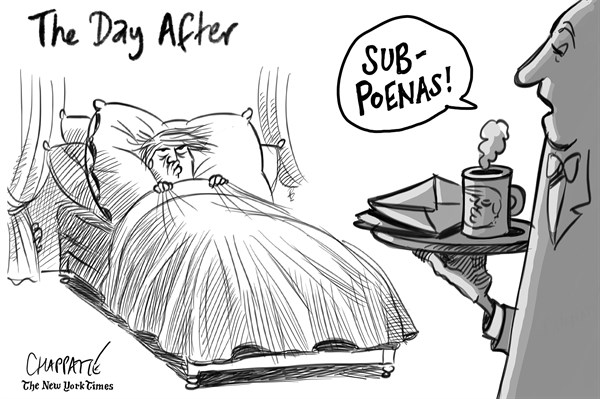
WASHINGTON — Is “Democratic discipline” an oxymoron?
For years, it was. But in the 2018 midterm elections, Democrats prevailed in the House because they managed to keep a singular and unrelenting focus on health care — refusing to take President Trump’s bait to engage in fights about MS-13, caravans, socialism, tax increases and other distractions du jour.
Since Democrats have finally found the formula for defeating Trump, now comes the most important question: Can they keep it together?
There will be an immediate clamor from the progressive base for impeachment proceedings and Medicare-for-all legislation, as well as votes on the guns, abortion, LGBTQ rights and immigration wish lists. Though oversight is important, there will be pressure for the party to consume itself with investigations of the president and multiple high-profile showdowns.
Democrats must resist this clamor. It is pointless to take up impeachment and single-payer health care and the like with Trump in the White House and his sycophants controlling the Senate. A GOP-style investigative orgy would help Trump politically by providing him an easy foil. This would jeopardize the people who gave the Democrats their majority — first-term Democrats from suburban swing districts. And it would deprive Democrats of their newly discovered path to success: message discipline.
“Message discipline brought us into the majority; message discipline will be necessary for us in order to keep the majority,”
Rep. Hakeem Jeffries, N.Y., co-chairman of the House Democratic Policy and Communications Committee, told me. “The last time Democrats were in complete control of government we … failed to adequately communicate what we were doing and why we were doing it. We cannot make that mistake this time around or it will be a short-term majority.”
Jeffries could be in a position to make good on this. A rising star, he is running to be caucus chairman, a top leadership post. And he, along with DPCC co-chairs Cheri Bustos, Ill., and David N. Cicilline, R.I., played a significant role in keeping House Democrats on message during the campaign. Again and again, they told their colleagues to keep it simple, even handing out laminated cards with a Campaigning-for-Dummies-style message, just three bullet points totaling 28 words:
“Lower your health care costs and prescription-drug prices.”
“Increase your pay through strong economic growth by rebuilding America.”
“Clean up corruption to make Washington work for you.”
Democrats in the most competitive races did stick to the script, avoiding the siren songs of impeachment and Medicare-for-all, Trump’s race-tinged cultural warfare and the Democratic tendency to muddle the message with scores of proposals. Fifty-seven percent of pro-Democratic ads in October were on health care, the Wesleyan Media Project reports. That, as well as the GOP’s attempts to repeal the Affordable Care Act and its protections for pre-existing conditions, helped elevate health care to the No. 1 voter priority, above the economy, more than doubling its importance to Democrats and independents since early 2017.
“The only way to successfully shape public sentiment in the era of Donald Trump is to have a message that is clear, concise, compelling and repeated over and over and over again,” Jeffries said. “For us to keep the majority we have to stay on message, which means a focus on kitchen table, pocket book issues that unify the American people.”
This is what the voters asked for Tuesday.
The majority makers for the Democrats were candidates who, though generally liberal, appealed to moderate voters in suburban districts with nonideological campaigns. “Democrats who attempted to win districts like that by appealing to the left’s base and running on issues like Medicare-for-all didn’t fare as well,” Vox observed, declaring “2018 was not the year of the winning progressive Democrat.” Bernie Sanders-style progressives lost seats that were within Democrats’ grasp in Nebraska, New York, California, Wisconsin, Indiana, Pennsylvania and Virginia.
All this also means that Nancy Pelosi, D-Calif., should reclaim the speaker’s gavel.
I agree with the many House Democrats who believe the 78-year-old minority leader should announce, preferably before party elections this month, that this will be her last term and that she will preside over an orderly transition to younger leadership.
But she is exceptional at keeping Democrats in line, a skill akin to the proverbial herding of cats. With no need to placate party factions for future leadership elections, she could be a merciless disciplinarian for this session.
“Democrats will not get off track,” Jeffries vowed. “We’re going to stay focused like a laser beam on the issues we presented to the American people in seizing the majority.”
Be disciplined, Democrats.
Follow Dana Milbank on Twitter, @Milbank.(c) 2018, Washington Post Writers Group
















